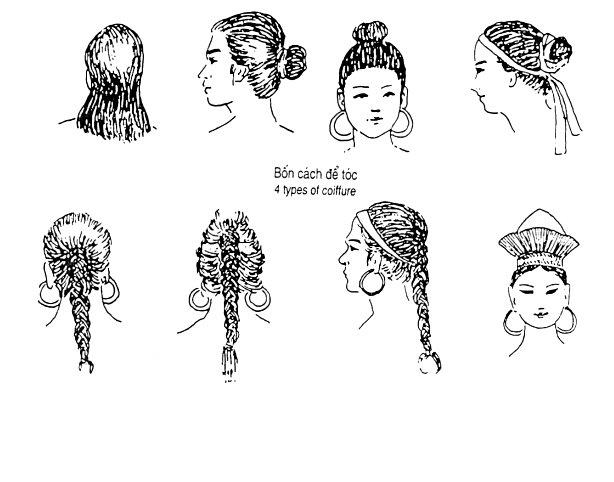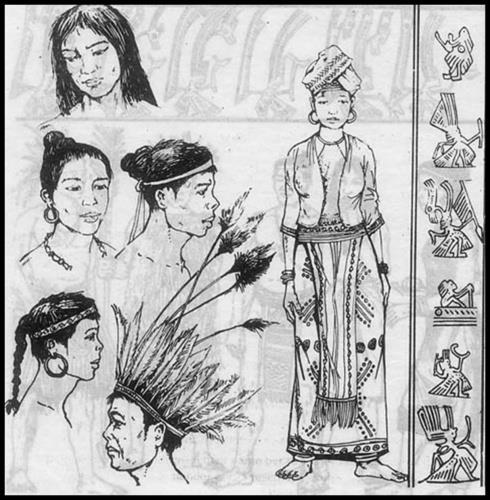1st King giving birth to our country - Kinh Duong Vuong was Yan Emperor Shen Nong’s fourth-born grandchild - god looks after agriculture in the heaven. Kinh Duong Vuong became the King in circa Nham Tuat (more than 2000 years B.C). He got married Dragon King's daughter – King of Dongting Lake and a son was born named Sung Lam. After King Duong Vuong died, Sung Lam ascended his father’s throne, preclaimed his name Lac Long Quan. Once, in his journey across the country, Lac Long Quan incidentally saw Au Co in Lang Xuong Cave. He married her and picked her up to Nghia Linh Mountain. No longer after, Au Co got pregnant and gave birth to a bundle. After 7 days, the bundle expanded into 100 eggs, each egg hatched a son. 100 sons promptly grew up all handsome, healthy, and intelligent. This can be regarded as the ancestors of the Bach Viet people. When their children had grown up, Lac Long Quan said to Au Co: “I am the Dragon King of the Sea, and you are the God of the Mountain. It is hard for us to stay together. I now will bring 50 sons to the sea; you will bring the rest to the mountain. We will share in the leading of our people. If either of us gets into danger, we will call out each other”. Lac Long Quan then led 49 sons into the sea, ceding the throne to the eldest son. He took his name Hung Vuong.

Hung Vuong ascended the throne, named the country Van Lang with its capital in Phong Chau (Bach Hac, Phu Tho), divided the country into 15 departments, namely Van Lang (Bach Hac, Phu Tho), Chau Dien (Shanxi), Phuc Loc (Shanxi), Tan Hung (Hung Hoa - Tuyen Quang), Vu Dinh (Thai Nguyen - Cao Bang), Vu Ninh (Bac Ninh), Luc Hai (Lang Son), Ninh Hai (Quang Yen), Yangquan (Hai Duong), Giao Chi (Ha Noi, Hung Yen, Nam Dinh, Ninh Binh), Cuu Chan (Thanh Hoa), Hoai Hoan (Nghe An), Cuu Duc (Ha Tinh), Viet Thuong (Quang Binh - Quang Tri), Binh Van ( ? ). Hung Vuong instituted the Hung Dynasty, and he is regarded as the real founder of Vietnamese nation and of the first Vietnamese Dynasty. All following Kings were called Hung Vuong. There are 18 Hung Kings as well. Kings called respectively literature officials Lac Hau, martial officials Lac Tuong, King's sons Quan Lang, King’s daughters My Nuong, small agencies Bo Chinh.
Van Lang State of Hung Kings was the first embryonic State of Vietnam, and retained a simple form. Although newly formed, it gathered people's hearts. From an emotion of community led to a sense of community, all reflected the compatriot. They were beginning to understand the relationship between nature and human, the power of community in irrigation, exchange products and fighting to preserve the village and the country.
Hung Dynasty had many legends circulated in folk. They always reflected the solidarity of the Vietnamese ethnic community. Apart from legends of Phu Dong Thien Vuong - Thanh Giong and Son Tinh - Thuy Tinh, there is also “the Banh Chung – Banh Day”, “the Watermelon”, “Chu Dong Tu”, “the oath stone Pillar”...

18th King Hung Vuong had no son; therefore, he abdicated his throne to Nguyen Tuan, i.e. Tan Vien, his son-in-law. At that instant, around 258 B.C, Thuc Phan, Hung King’s grandchild and Tay Vu tribe’s Lac Tuong brought his troops to war. It led to Hung – Shu war. Tan Vien then advised the king to abdicate Thuc Phan. Thuc appreciated Tan Vien, then constructed two stone pillars on top of Nghia Linh Mountain and vowed to protect the country and worship the Hung Kings. Then he proclaimed himself King An Duong Vuong with the capital at Co Loa Citadel (Dong Anh, Hanoi), and renamed his newly acquired State from Van Lang to Au Lac.
Fifty years later, Trieu Da (Zhao Tuo) a Chinese general, defeated King An Duong Vuong, conquered the kingdom and formed the new nation. They called it Nam Viet. Many scholars and Vietnamese people considered this to be the end of historical legend and the true beginning of modern Vietnamese history. Then the next 100 or so years saw much conflict between King Trieu Da (Zhao Tou) and the Han emperors of China. Finally, in 111 B.C., Nam Viet was conquered and incorporated into the Chinese empire.
